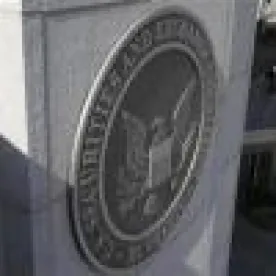The Securities and Exchange Commission (SEC or the Commission) has announced a series of initiatives reorienting the Commission’s agenda to focus on environmental, social, and governance (ESG) issues. In particular, the Commission is gearing up to develop a framework to address ESG disclosures, including climate change risk and diversity and inclusion metrics. According to Chairman Gary Gensler, an ESG disclosure rulemaking is a “top priority.” Accordingly, we expect the Commission could issue a proposed rulemaking regarding such disclosures later this year.
A CLIMATE AND ESG DISCLOSURE FRAMEWORK
On 15 March 2021, then-Acting Chair (now Commissioner) Allison Herren Lee delivered a speech discussing plans to establish an “ESG reporting framework that would complement our financial reporting framework” (ESG Speech).1 She stated that “no single issue has been more pressing for me than ensuring that the SEC is fully engaged in confronting the risks and opportunities that climate and ESG pose for investors, our financial system, and our economy” and that “[h]uman capital, human rights, climate change… are fundamental to our markets, and investors want to and can help drive sustainable solutions on these issues.”
Accordingly, she announced the publication of a request for public comment on climate-related risk disclosure rules.2 Moreover, she reiterated her February 2021 directive that the Commission staff will update the SEC’s 2010 climate change guidance and evaluate public companies’ compliance with the 2010 climate change guidance.3 In addition to these developments, she stated that the Commission will consider issuing guidance regarding human capital disclosures as well as guidance or a rulemaking regarding board diversity.
Regarding the request for public comment, Commissioner Lee stated that “[p]ublic input on the Commission’s disclosure rules and guidance as they apply to climate change disclosures…can include comments on existing disclosure requirements in Regulation S-K (or, for foreign private issuers, Form 20-F), [and] potential new Commission disclosure requirements” or frameworks. Moreover, “comments generally as to how the Commission can best regulate climate change disclosures are welcomed.” The comment period closes on 14 June 2021.
Commissioner Lee also stated that the SEC is considering whether to create a “dedicated standard setter for ESG,” praising the International Organization of Securities Commission’s establishment of the Sustainability Standards Board. Notably, John Coates, the Acting Director of the Commission’s Division of Corporation Finance, has said that the SEC should be “playing a leading role in the development of a baseline global framework” but cautioned that a single global standard “raises a number of considerations.”4 Acting Director Coates has also set forth his views on an ESG disclosure framework. In a speech on 11 March 2021,5 he argued that “[t]he SEC should help lead the creation of an effective ESG disclosure system so companies can provide investors with information they need in a cost effective manner.” To be effective, he believes the disclosure system will need to be built on consensus with investors and companies, and it should address key questions, such as what information is most useful and how to verify accuracy of disclosures.
In testimony before the House Financial Services Committee in early May, recently confirmed Chairman Gary Gensler stated that an ESG disclosure rulemaking is one of his top priorities. He also reiterated his views that climate risk and various ESG disclosures are material because many (and a growing) number of investors are demanding such data. He stated that the SEC should step in to ensure that such disclosures are consistent and comparable, indicating that the SEC will release a proposed rule on ESG disclosures following its current open comment period sometime this year.
A DIVIDED COMMISSION
Commissioners Hester Peirce and Elad Roisman have expressed several reservations about such disclosures. The Commissioners issued a joint statement on 4 March 2021 commenting that the meaning of “enhanced focus” on climate-related matters is “not yet clear” and that they “assume that the [Division of Corporation Finance’s focus on climate-related disclosures] is simply a continuation of the work the staff has been doing for more than a decade and not a program to assess public filers’ disclosure against any new standards or expectations” because the “Commission has not voted on any new standards or expectations relating to climate-related disclosure.”6 Similarly, they noted that the directive for Commission staff to update the 2010 climate guidance cannot “elicit more specific line items or otherwise convert the Commission’s generally principles-based approach to a prescriptive one.”7 Recognizing the speed of the agenda, they noted that they “look forward to working with SEC staff in the relevant divisions as they review disclosures, assess the adequacy of our guidance and rules, examine for compliance with our rules, and pursue securities law violations.”8
In remarks to the Asset Management Advisory Commission (AMAC), they expanded on their concerns. Commissioner Peirce stated that “[t]o get to broad ESG disclosure mandates for issuers, we have to reimagine materiality. But reimagining materiality is the same as tossing it in favor of a more malleable new edition. Materiality has served us well, and undermining it to accommodate ESG will harm investors.”9 Commissioner Roisman called for a more collaborative and open-minded dialogue on ESG issues, noting that “[i]f the only people who feel safe to comment are those who want the agency to join the fight against climate change and those whose business models would benefit from new regulation, we will miss hearing from those voices who can alert us to the hidden costs and unintended consequences of our actions.” He also raised various questions to drill down on specific ESG data that helps inform investors’ decisions.10
Since then, both commissioners have made similar speeches and remarks stressing these concerns, drawing a firm line of disagreement.
Michael G. Lee contributed to this article.
NEXT STEPS
We anticipate that the SEC will move quickly to issue a proposed rule. Such a proposal could come even as early as the late summer or early fall given that the climate risk disclosure request for information closes in mid-June. These developments and others are being tracked on the SEC’s new ESG-focused webpage: “SEC Response to Climate and ESG Risks and Opportunities.”
1 Allison Herren Lee, Acting Chair, U.S. Sec. & Exch. Comm’n, A Climate for Change: Meeting Investor Demand for Climate and ESG Information at the SEC (Mar. 15, 2021).
2 Allison Herren Lee, Acting Chair, U.S. Sec. & Exch. Comm’n, Public Input Welcome on Climate Change Disclosures (Mar. 15, 2021).
3 Allison Herren Lee, Acting Chair, U.S. Sec. & Exch. Comm’n, Statement on the Review of Climate-Related Disclosure (Feb. 24, 2021).
4 John Coates, Acting Dir., Div. of Corp. Fin., U.S. Sec. & Exch. Comm’n, ESG Disclosure – Keeping Pace with Developments Affecting Investors, Public Companies and the Capital Markets (Mar. 11, 2021).
5 Id.
6 Hester M. Peirce & Elad L. Roisman, Enhancing Focus on the SEC’s Enhanced Climate Change Efforts, U.S. SEC. & EXCH. COMM’N, (Mar. 4, 2021).
7 Id.
8 Id.
9 Hester M. Peirce, Remarks at Asset Management Advisory Committee Meeting, U.S. SEC. & EXCH. COMM’N, (Mar. 19, 2021).
10 Elad L. Roisman, Commissioner, U.S. Sec. & Exch. Comm’n, An Honest Conversation about ESG Regulation (Mar. 19, 2021).








 />i
/>i


